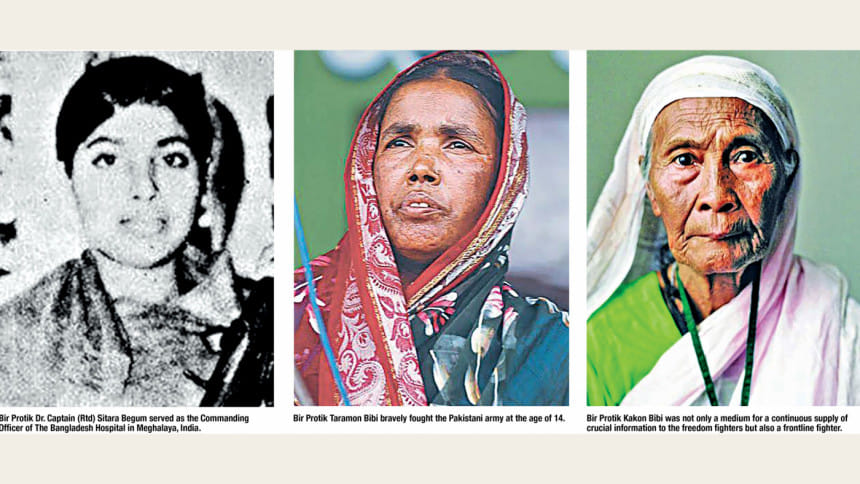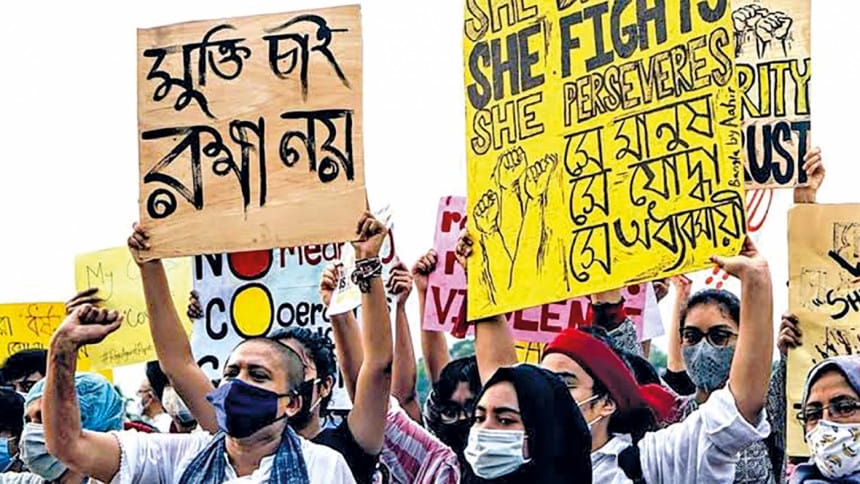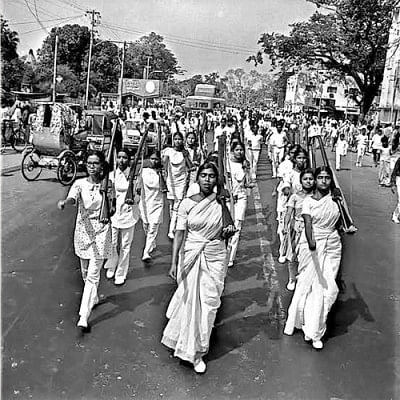50 years later, the fight goes on

When speaking about our Liberation War of 1971, we often commend our freedom fighters for their sacrifices and bravery and condemn the then Pakistan army for inflicting inhumane torture on our innocent people, especially our women. While the latter is important, it is also equally vital to recognise and celebrate the contributions of the valiant women freedom fighters in ensuring Bangladesh's victory after a long nine-month struggle. This International Women's Day, let's dive into the stories of three gallant women freedom fighters who have been awarded the title of Bir Protik due to their unparalleled roles in leading us towards freedom.
Although countless women have fought to free our country, on 15th December 1973, only two women were awarded the title of Bir Protik, the rest had to wait much longer to receive their due recognition. Even then, all the women who have fought in the liberation war are still not given their due recognition as freedom fighters. One of the two women who were awarded the Bir Protik title in 1973 is Dr. Captain (Rtd.) Sitara Begum. Born in British India in 1945, Sitara is a doctor and an army officer. After studying medicine at Dhaka Medical College hospital, she joined the army's medical corps as a lieutenant in the year 1970. The political tension between the two factions of Pakistan was reaching its peak then and during those days of unrest, Sitara was posted in the Comilla Cantonment. Fortunately for her, when the non-cooperation movement started in 1971, she was in Kishoreganj for the Eid holidays. Before she could return to cantonment, her brother, the gallant freedom fighter Major ATM Haider, warned her about returning back to cantonment. Her brother then sent Sitara and their parents along with some Muktibahini members to Meghalaya, India. This is where Sitara's fight for freedom started.
Sitara became the Commanding Officer of a makeshift hospital in Meghalaya which was built for the treatment of wounded freedom fighters. The Bangladesh Hospital was a 400 bed hospital which was mainly run by the final year students of medical college. Along with freedom fighters, the hospital also tended to other Bengali patients and even members of the Indian Army and all the medical attendants toiled day and night with little to no pay or recognition. In the midst of all the chaos of managing a hospital and tending to the hundreds of wounded patients, Sitara also regularly travelled to Agartala to gather the necessary medical supplies.
On December 16, 1971, Bangladesh's independence was announced through the radio. Sitara and her colleagues at the hospital finally rejoiced at their victory after the nine months of uncertainty that they all had to fight through. A few weeks later, Sitara returned to Dhaka. The new and independent Bangladesh that she helped liberate was supposed to be her home and safe haven but after the coup d'etat of 1975 where her brother was murdered, Sitara and her family left the country to settle in America.

When we envision gallant freedom fighters, we usually picture adults in their twenties or thirties. We think about college students or officers similar to that of the previous story. We rarely imagine teenagers fighting the Pakistani army with arms. Bir Protik Taramon Bibi was only about 13 or 14 years old when she joined the Mymensingh-Tangail camp where she initially cooked and cleaned for the campmates. At the camp, there was also Taramon's godfather, Muhib Habildar, who noticed the courage and fearlessness that resided within this young teenager. He also knew how much love Taramon had for her country.
Muhib then took up the responsibility of training his young goddaughter to become a freedom fighter. During her time as a freedom fighter, Taramon battled with the Pakistani army on so many occasions that she can no longer keep count of the incidents. Her very first encounter with the Pakistani army was when the other freedom fighters got wind of a gunboat carrying Pakistani soldiers towards their location. Without any hesitation, Taramon joined the rest of the Muktijoddhas and successfully defeated the enemy. After that first combat, she faced several other close encounters with death with the Pakistani army raiding their camps and even throwing bombs at them. But, throughout it all, Taramon's resilience never gave in and her godfather always stood beside her.
Despite her major contribution in the war, where she risked her life for the country at the age of about 14, after the independence, no one was able to locate her whereabouts. As a result, she was unable to receive her Bir Protik title in 1973. Later, after 24 years, in 1995, her location was found by a researcher and she was finally awarded the prestigious Bir Protik title.
The story of the third Bir Protik seems something straight out of an action movie. When we hear the term "double agent", our mind instantly shifts to the world of television. But, Bir Protik Kaket Hennyata, known most commonly as Kakon Bibi, lived with such an identity back in 1971 in an effort to feed insider enemy information to freedom fighter troops. Kakon Bibi was born into a Khasia family at Natrai village of Meghalaya, India. Her father, Gishoy, passed away when she was only six years old, while her mother, Meli, perished just a year later. Under the care of her sister and brother-in-law, she was married off at only 15 years of age to a Punjab EPR soldier named Abdul Majid Khan. The soldier was later transferred to Sylhet, and the couple soon lost touch. As a fresh start, she married Shahid Ali, a local of the Kathalbari area in Dowarabazar, but the marriage ended in divorce.

After the war broke out, Kakon Bibi moved to Kathalbari camp under Bashbari sub-sector, where she soon met Sector Five Commander Mir Shawkat Ali. He requested her to disguise herself as a beggar to gain secret information about the Pakistan army's plans and whereabouts. The plan was working smoothly for a while as she unsuspectedly spied on the enemy. However, one day, her cover was blown, and she was taken away by the Pakistani troops. The men mercilessly tortured and raped her. They then took her to their camp in Tengratilla. Kakon Bibi knew she had to find a way out of this, so she came up with a lie that could help protect herself. She went straight to the Pakistani Commander and explained how she was there only to search for her long lost husband, soldier Abdul Majid Khan. Her persuasion worked, and the Commander decided to hand her an ID card. She was told to spy on the freedom fighters for the Pakistan Army, but she continued to work the other way round. She never let our troops down.
Kakon Bibi was not only a medium for a continuous supply of crucial information to the freedom fighters but also a frontline fighter. After her spy work was over, she learned how to operate a gun and fought in around 20 battles against the Pakistani Army. Her body held witness to all the injuries she faced while fighting for our freedom.
Despite being such a heroic warrior during 1971, Kakon Bibi felt the need to step away from the public eye due to the hostility any rape survivor has to face in our society. She had to hide away for so long that it wasn't until 1996 that she received her award of Bir Protik. Kakon Bibi passed away in March 2018, but through her stories, her legacy lives on.
Kakon Bibi's life of forced seclusion after the liberation war paints a clear picture of the kind of discrimination a woman can face in this country, even if the woman played a significant role in ensuring Bangladesh's freedom. Although the government attempted to fight through social stigma by awarding rape survivors of the liberation war with the title of "Birangona," it was hard not to notice the stark difference in how men were treated after the war compared to women. While the male freedom fighters were celebrated to no end, the women freedom fighters were subject to undue judgement and ostracisation. Aside from the gallantry titles, to this date, the male freedom fighters and their family still enjoy various benefits along with the respect of the countrymen. On the other hand, the women fighting the war were harshly swept aside. Even with countless women being a part of the liberation war, when we think of the war, we still imagine men with arms; while the women are reduced to the role of victims in our minds.
50 years later, not much has changed for the women dwelling in this nation. This begs the question: Have we really achieved freedom?
Do we condemn our men for raping our women the same way we condemned the Pakistani soldiers of 1971? 50 years have passed since independence, yet our rape cases are nowhere near zero. Not a single woman feels safe walking outside alone after dark or even in bright daylight. No survivor has been able to escape society's victim-blaming and ostracisation. People are still on the roads, fighting for their bodily rights and autonomy, protesting against the harmful culture of rape, hoping to someday achieve what can be deemed a truly free Bangladesh. While these fearless freedom fighters may have started the struggle for freedom, the fight is not even close to over.
Mayabee Arannya and Tasnim Odrika are journalists at The Daily Star.
Guidelines for In Focus submissions:
The Daily Star In Focus welcomes your submissions on issues that are relevant, timely and of public interest. If you want to submit an article or pitch an idea for an article for the page please email us at [email protected]

 For all latest news, follow The Daily Star's Google News channel.
For all latest news, follow The Daily Star's Google News channel. 



Comments